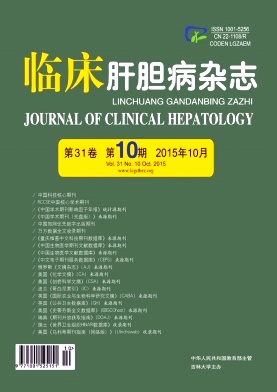| [1] | Wang AiMin, Jiao HaiTao, Fang ChaoRan, Li JianHui. A case of splenic rupture after endoscopic retrograde cholangiopancreatography[J]. Journal of Clinical Hepatology, 2020, 36(6): 1356-1357. doi: 10.3969/j.issn.1001-5256.2020.06.035 |
| [2] | Hua HaiYang, Li JianHui, Su Bin, Xuan XiaoYu. Liver subcapsular biliary cyst successfully treated by endoscopic retrograde cholangiopancreatography: A case report[J]. Journal of Clinical Hepatology, 2020, 36(6): 1354-1355. doi: 10.3969/j.issn.1001-5256.2020.06.034 |
| [3] | Shi BaoPing, Fu Yan, Lu MingLiang, Liu GuoBin, Li XinHua, Wei Li, Hu YiTao, Yang Juan. Clinical effect of different methods for endoscopic precut sphincterotomy in difficult intubation during endoscopic retrograde cholangiopancreatography: A comparative analysis[J]. Journal of Clinical Hepatology, 2019, 35(8): 1760-1765. doi: 10.3969/j.issn.1001-5256.2019.08.022 |
| [4] | Zhao YouYou, Zhang Duan, Yin Xin, Wen XiaoYu, Gao PuJun. Glucocorticoid treatment of intrahepatic cholestasis caused by infectious cholangitis: A case report[J]. Journal of Clinical Hepatology, 2019, 35(2): 386-387. doi: 10.3969/j.issn.1001-5256.2019.02.031 |
| [5] | Chinese Digestive Endoscopist Committee, Chinese Endoscopist Association, Chinese Physicians′Association, Pancreatic Disease Committee, Chinese Physicians′Association. Expert consensus on perioperative medication for endoscopic retrograde cholangiopancreatography[J]. Journal of Clinical Hepatology, 2018, 34(12): 2555-2562. doi: 10.3969/j.issn.1001-5256.2018.12.010 |
| [6] | Zhang WeiFeng, Li JiaSu, Liu Feng, Cheng YiFeng, Shen Peng. Research advances in the prevention and treatment of pancreatitis after endoscopic retrograde cholangiopancreatography[J]. Journal of Clinical Hepatology, 2018, 34(3): 658-662. doi: 10.3969/j.issn.1001-5256.2018.03.049 |
| [7] | Wang XiangPing, Pan YangLin, Guo XueGang. Advances in endoscopic retrograde cholangiopancreatography[J]. Journal of Clinical Hepatology, 2018, 34(3): 473-481. doi: 10.3969/j.issn.1001-5256.2018.03.004 |
| [8] | ERCP group, Chinese Society of Digestive Endoscopology, Biliopancreatic group, Chinese Association of Gastroenterologist and Hepatologist, Na- tional Clinical Research Center for Digestive Diseases. Chinese Guidelines for ERCP(2018)[J]. Journal of Clinical Hepatology, 2018, 34(12): 2537-2554. doi: 10.3969/j.issn.1001-5256.2018.12.009 |
| [9] | Wang QunRu, Zhang Yong, Mou Dong, Chen BeiJin, Ni Hua, Gao Hui. Association between hematobilia and primary disease after therapeutic endoscopic retrograde cholangiopancreatography[J]. Journal of Clinical Hepatology, 2017, 33(5): 896-898. doi: 10.3969/j.issn.1001-5256.2017.05.021 |
| [10] | Wang ChunQiu, Ma YingCai, Zhu ZhiYong, Yuan Ling. Risk factors for recurrence of common bile duct stones after endoscopic retrograde cholangiopancreatography[J]. Journal of Clinical Hepatology, 2017, 33(2): 297-299. doi: 10.3969/j.issn.1001-5256.2017.02.019 |
| [11] | Zhao Jian, Tian Hao, Yao DingKang. Research advances in primary biliary cholangitis complicated by osteoporosis[J]. Journal of Clinical Hepatology, 2017, 33(11): 2226-2229. doi: 10.3969/j.issn.1001-5256.2017.11.039 |
| [12] | Dong KaiHui, Wang Yao, Fang YiNa, Kui YiWen, Wen XiaoYu, Jin QingLong. Renal tubular acidosis in primary biliary cholangitis:a case report[J]. Journal of Clinical Hepatology, 2017, 33(11): 2190-2191. doi: 10.3969/j.issn.1001-5256.2017.11.029 |
| [13] | Wang Ai, Zhao LiJin. Research advances in pharmacological prevention of pancreatitis after endoscopic retrograde cholangiopancreatography[J]. Journal of Clinical Hepatology, 2017, 33(1): 184-187. doi: 10.3969/j.issn.1001-5256.2017.01.043 |
| [14] | Sun ChunYan, Ma Xiong. An excerpt of EASL Clinical Practice Guidelines: the diagnosis and management of patients with primary biliary cholangitis(2017)[J]. Journal of Clinical Hepatology, 2017, 33(10): 1888-1894. doi: 10.3969/j.issn.1001-5256.2017.10.008 |
| [15] | YIERPAN Aishan, Gao Feng. Risk factors for hyperamylasemia after endoscopic retrograde cholangiopancreatography[J]. Journal of Clinical Hepatology, 2016, 32(1): 119-122. doi: 10.3969/j.issn.1001-5256.2016.01.022 |
| [16] | Liu HuiFang, Zhang ChengHua. Analysis of bile bacteria culture and their antibiotic sensitivity in patients with varying degrees of acute cholangitis[J]. Journal of Clinical Hepatology, 2014, 30(11): 1153-1156. doi: 10.3969/j.issn.1001-5256.2014.11.015 |
| [17] | Zhang RuoYan, Du XiaoHong, Wang Meng, Ye JunFeng, Jin GuoXing, Wang GuangYi. Severe thrombocytopenia in AOSC after ERCP: a report of one case[J]. Journal of Clinical Hepatology, 2014, 30(4): 373-374. doi: 10.3969/j.issn.1001-5256.2014.04.022 |
| [18] | Wang JiHeng, Gao Ge, Shi JiuJian. Causes and countermeasures of delayed hemobilia after endoscopic retrograde cholangiopancreatography[J]. Journal of Clinical Hepatology, 2013, 29(9): 692-694. doi: 10.3969/j.issn.1001-5256.2013.09.015 |
| [19] | Wang Meng, Wang GuangYi, Qiu Wei, Zhang Ping. Efficiency analysis of precut sphincterotomy in ERCP with difficult cannulation[J]. Journal of Clinical Hepatology, 2012, 28(1): 14-16. |
| [20] | Chen Juan, Liu Jun, Deng DengHao, Xiang XiaoXing, Chen ChaoWu, Chen Di, Lu BangQiao, Lu LingBo, Huang WenNuo. Endoscopic retrograde cholangiopancreatography therapy of large common bile duct stones in 40 elderly patients [J]. Journal of Clinical Hepatology, 2012, 28(10): 782-784. |













 DownLoad:
DownLoad: